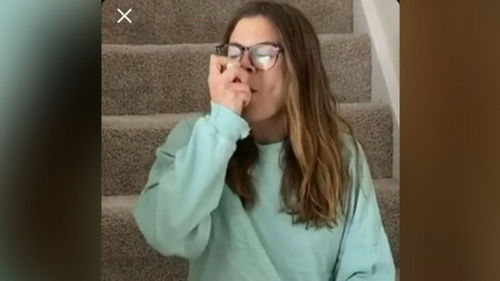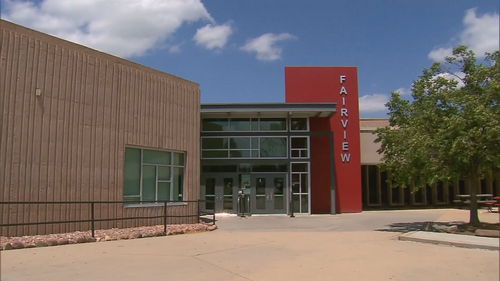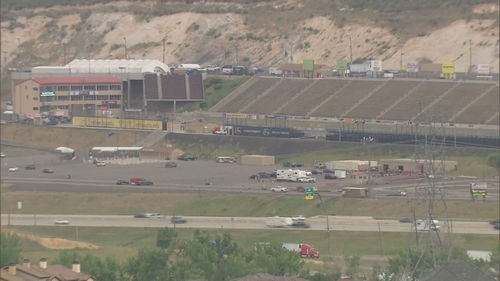Hitchings received treatment as if she were positive, including an inhaler and steroid cough medication. She was living with her fiancé at the time, who caught the virus days later while in quarantine with her.
“I was walking down the stairs to go to the couch and I lost my breath so badly that my fiancé had to go up and grab the inhaler,” Hitchings told CBS4 on Thursday. “I had to just sit on the steps for a couple minutes.”
A math teacher at Fairview High School who contracted COVID-19 in the spring wrote a letter this week to Gov. Jared Polis warning about a return to in-person learning. Courtney Hitchings, 26, explained that as a young, active woman she faced a tough recovery and still may have symptoms months later from coronavirus.
“The cough was overbearingly debilitating to my lungs,” Hitchings remembers during her recovery at home in March.
She says school closed on a Friday because of the pandemic and she started noticing symptoms on Sunday. A slight cough led to chest pain and then a fever. She couldn’t see a doctor or access a test because it happened so early in the response to coronavirus.

She was taking three doses of the inhaler three times a day, noticing if she missed a dose it would affect her breathing. She and her fiancé stayed home until mid-April, and later tested for antibodies at National Jewish Health. The test confirmed they both had the virus recently, matching the timeline she had tracked on her own.

“I’m a very active person, so I wasn’t doing anything crazy,” Hitchings said. “I started having the most severe shocks of pain through my entire left leg.”
Just weeks after feeling like she had recovered from COVID-19, she noticed some hip pain at the end of April. Even though she loved living an active life in Colorado, she had tried hard not to exert herself since her symptoms developed. But the new pain in her leg made her numb and she almost fell.
Doctors told her she had neurological symptoms and a test confirmed she had two compressed nerves in her back. Hitchings is in physical therapy and her medical team is looking into a possible connection to COVID-19.
“I survived and I said it before, I feel very lucky,” she said. “I didn’t have to go on a ventilator, I didn’t die, that’s amazing but it still has directly impacted my everyday life.”
Hitchings believes it is not enough to treat COVID-19 as simple cases where someone survives or dies. She thinks there needs to be a closer look at those who survive and what they go through during and even after the virus passes. She only recently started enjoying the outdoors toward the end of July.

As someone who loves camping and climbing 14ers, she says the summer has passed her by while she has spent the season treating her symptoms since getting sick. The reasons why she and others love living in Colorado were taken away from her.
Hitchings said she plans to get a physical soon to check her heart and lungs.
“We are able to go outside and be adventurous during COVID because we have so many opportunities,” she said.
Hitchings, who is known to her students as Ms. Chernin, changed her name this week after getting married. She is especially concerned about the impact the virus could have on them, given how close she is in age to them. While most of her students are sophomores and juniors, they range in age with some as old as 18.
“Saying that young people aren’t affected in a bad way or they’ll survive takes away from the fact that this is still a virus that is way more intense than anything you’re used to,” Hitchings said. “When I taught online in the spring, it broke my heart, I didn’t enjoy not seeing my students, not being around my students but I knew that it was necessary.”
She says her school and the district rushed to switch to remote learning in the spring when we did not know enough about coronavirus. As the school plans for a hybrid learning format in the fall, she is discouraged by the decision because she believes we still do not know enough about COVID-19. She worries the Phase 3 reopening the district has chosen on a five-phase scale is not strict enough to prepare for the worst case scenario.
“I’d rather start remote, really get some answers, and then hopefully sooner rather than later we can go full back,” Hitchings said. “There will be an outbreak, we know people will get it, and that sentence alone sounds to me like we shouldn’t be open.”
Many students live with others who are more susceptible to the virus, another consideration she thinks is not getting enough attention. She says that even with all the appropriate precautions during school hours, the district cannot account for what students and staff, as well as their families, do on their own time.
Even though she knows Hitchings contracted the virus, she has always acted as if she could get it again. As school begins, she says she will take precautions to make sure she doesn’t get COVID-19 or spread it.
“We don’t know enough about the virus to be sure that our students will not be directly affected,” she said. “I want my students to be safe so I know if we choose remote that teachers around the country will do what we need to make sure those kids are okay.”
She acknowledges that the plan for reopening schools is, in part, considering the access and resources some families lack. While she knows it will be a challenge again in the fall, she believes the district did its best to help those in need during the spring.
Classes begin in mid-Aug. and she plans to be a teacher working on campus and teaching in-person so that others who need to work remotely have the option.
“I don’t think we’re ready and I think we’re overlooking the effect that this can have on our staff and students mentally and physically,” Hitchings said. “It’s not worth it, it’s really is not worth it, it was horrible.”



